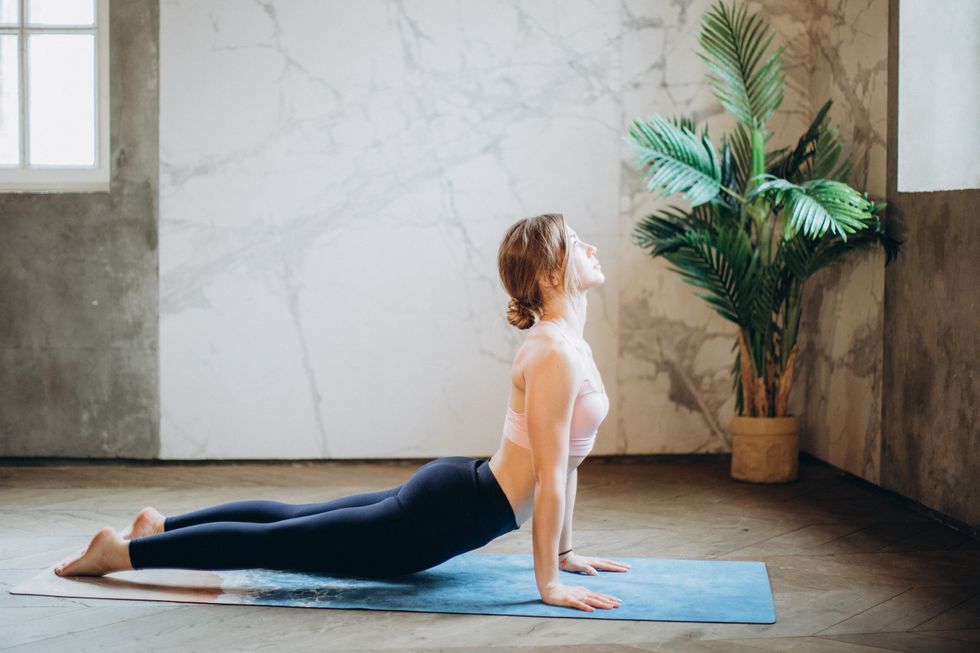Before the pandemic, I exercised a handful of times a week at best. In quarantine, I've been exercising every single day. I don't want this article to be another spiel about how exercise "changed my life," and all the other cliches that health gurus use to convince others to work out more. Rather, I want to reveal that exercise is a tool that works for me because it boosts my mental health when I feel like the world is spiraling out of control.
Even prior to our worldwide crisis, running has been my go-to physical activity. By that I mean I would jog around Emory's third-floor gym track for 15 minutes right before it closed so no one would see me as a sweaty mess. I could go running anywhere I was — I didn't need any equipment, and I could be alone so no one else had to witness my Darth Vader breathing. But when I got sent home from Emory to a small town of about 3,000 people, running switched from an occasional endeavor to a necessity for sanity. Even though I'm blessed with my own room and an incredible family, I still felt the weight of tensions and irritations arising from five people stuck in the same house for two months. And so I laced up my second-hand sneakers, popped in a podcast from The Porch, and ran. First a mile, then two miles, and finally, a 5K.
While jogging definitely became an escape from my physical circumstances, my runs also allow me to get outside of my head.
When I'm running, I don't feel stuck in the neverending loop of my one-track mind. Instead, I receive mental clarity and I feel motivated to take actionable steps on my anxious thoughts. Running gives me a healthy coping mechanism for anxiety because I feel like I tangibly exhale stress every time my sneakers hit the pavement. Additionally, running allows me to strengthen my spiritual health along with my physical health. By listening to worship music and Christian podcasts, I feel like my runs give me space to connect with God in a new and personal way. I rarely have a "good" run — between allergies and the desire to give up after a mile, I feel like my neighbors see me as more of a dying horse than an athlete.
But I can't deny that going on regular jogs has improved both my mental and spiritual well-being, and has made me into a better person.
On top of running, I've created a habit of exercising virtually with my friends from Emory. On campus, we convinced ourselves to exercise together maybe three times a semester (sometimes it was past midnight, oftentimes it was regretful). During quarantine, on the other hand, I've worked out with my friends, Jasmine and Amanda, nearly every single day. We have laughed, sweated, and died a little bit on the inside together, all over a Zoom call. While our workouts challenge me physically (we're currently going through the Chloe Ting 2-week shred challenge — I didn't know so many muscles could hurt at once), they have definitely helped to lift my spirits.
As an amateur exerciser who once thought that climbing the hill to her dorm counted as a workout, having friends to exercise with me, even over Zoom, assures me that I am not dying alone. More than that, these daily workouts have helped my relational anxiety by providing me certainty when I feel like my relationships are all changing. After all, it's difficult to maintain the same proximity to your college friends when a pandemic separates you. Even though I feel stressed about my friendships, I've found stability by committing to meet with my workout buddies, every afternoon. I'm also so blessed to say that we're more than just workout buddies — these ladies and I do life together. We celebrate our highs and support each other in our lows in between workout videos, and we encourage each other even beyond completing a round of plank jacks.
As well as working out in real-time, some friends and I have recently started a 30 Days of Yoga with Adriene Challenge for the month of May. As someone who practices yoga maybe three times a semester, I feel like doing yoga every single day has been an interesting challenge (to say the least). While yoga has increased my flexibility, it has also helped to improve both my mental and spiritual health. I know that people always rattle off yoga in a long list of ways to help fight mental illness, but I'm here to advocate that it actually works. Seriously, my mind is like a train that chugs all day long, and yoga is one of the few activities that put the brakes on my anxious thoughts and brings me peace. More than that, yoga trains me to take my gaze away from future worries and anxieties to be present at the moment and to engage in mindfulness instead.
Part of the reason I can engage in this mindfulness is that I use yoga as a way to strengthen my faith. I mute the video (sorry, Adriene) to put on some soft worship music, and let myself simply exist in the presence of God and bring my worries before Him. I'm far from perfect in my yoga practice: there are days where I am worried instead of mindful, I spend my time obsessing over a situation that happened earlier in the day, or I am worrying about texts I still have to send. Yet through my challenge, I've learned the importance of taking life one day at a time (Matthew 6:34), and I'm striving to be less anxious and more present in my day-to-day.
I work out a lot during the quarantine. That doesn't mean you have to. The reason I exercise is that physical activity makes me feel in control. As a germaphobe with anxiety, I've been frustrated because I can't have certainty about the current and future state of this pandemic and our world. For example, I can control whether I touch my face in public or not, but I don't have a say about what germs my family brings back to our house. I can pray for wisdom for governing officials, but I am ultimately not in charge of making decisions that affect the state of the world around us. But there is one thing I can control. I can lace up my running shoes, or roll out my yoga mat, and make sure I get my body moving. Maybe you're not feeling the need to be in control like I am, or you're dealing with stress in a completely different way. That's okay, too.
As I'm sure you've heard, we are in crazy and unprecedented times right now, so I believe it's more important to look after your mental health instead of getting snatched. (As someone who is eating chocolate while writing this argument, you can take my opinion with a grain of salt.) I believe in the importance of engaging in activities that make you feel happy, satisfied, and at peace during this weird period. Whether that is jogging, reading, spending time with loved ones, or watching Netflix, I hope you find ways to improve your mental health, even if the world around you seems turbulent.



















